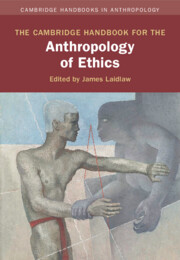Book contents
- The Cambridge Handbook for the Anthropology of Ethics
- Cambridge Handbooks in Anthropology
- The Cambridge Handbook for the Anthropology of Ethics
- Copyright page
- Contents
- Contributors
- 1 Introduction
- Part I Intellectual Sources and Disciplinary Engagements
- Part II Aspects of Ethical Agency
- Part III Media and Modes of Ethical Practice
- Part IV Intimate and Everyday Life
- Part V Institutional Life
- 29 Modern Capitalism and Ethical Plurality
- 30 The Ethics of Commerce and Trade
- 31 Activism and Political Organization
- 32 Philanthropy
- 33 Science
- 34 Communist Morality under Socialism
- Index
- References
29 - Modern Capitalism and Ethical Plurality
from Part V - Institutional Life
Published online by Cambridge University Press: 11 May 2023
- The Cambridge Handbook for the Anthropology of Ethics
- Cambridge Handbooks in Anthropology
- The Cambridge Handbook for the Anthropology of Ethics
- Copyright page
- Contents
- Contributors
- 1 Introduction
- Part I Intellectual Sources and Disciplinary Engagements
- Part II Aspects of Ethical Agency
- Part III Media and Modes of Ethical Practice
- Part IV Intimate and Everyday Life
- Part V Institutional Life
- 29 Modern Capitalism and Ethical Plurality
- 30 The Ethics of Commerce and Trade
- 31 Activism and Political Organization
- 32 Philanthropy
- 33 Science
- 34 Communist Morality under Socialism
- Index
- References
Summary
Since its appearance on the Western landscape three centuries ago, modern capitalism has given rise to a mythology that, unlike previous socio-economic orders, is so powerful that it can function without an ethical embedding – or simply create one in its own image. This essay argues that this end-of-ethics talk is premature, and only obscures the fact that capitalism is plural in its political and ethical forms, and equally varied in its social organizations and relation to the state. Rather than capitalism everywhere creating a homogeneous ethical landscape by bulldozing intermediary institutions and extra-market value spheres, capitalist societies have given rise to an agonistic plurality of political and moral embeddings and contentions. The essay explores this diversity through a comparison of modern capitalisms in Western, East Asian, and Islamic world areas.
Keywords
- Type
- Chapter
- Information
- The Cambridge Handbook for the Anthropology of Ethics , pp. 731 - 759Publisher: Cambridge University PressPrint publication year: 2023



